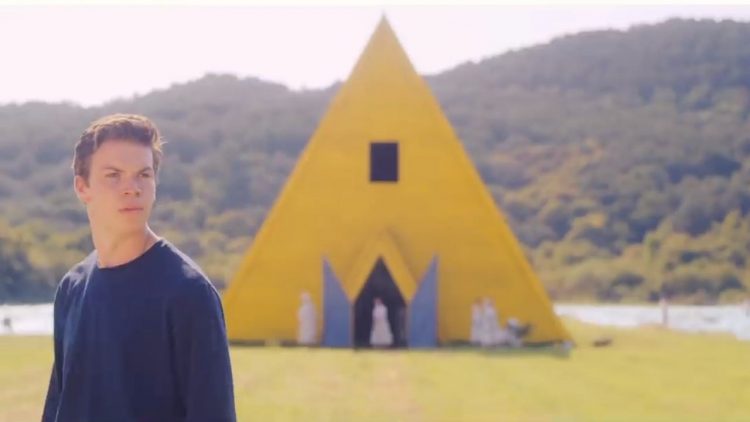Midsommar | Ari Aster’s Wildly Ambitious Flawed Follow-Up to Hereditary
There’s a moment early on in Midsommar which sums up the vibe of writer-director Ari Aster’s work. Just as college student and total bro Christian (Jack Reynor, Sing Street) reveals to his friends he is thinking of breaking up with his anxiety afflicted girlfriend, Dani (Florence Pugh, Outlaw King), to go on a lads trip to Sweden, he gets a call from her wailing. He soon learns her whole family have been killed in an accident.
Like much of the Hereditary director’s output, the scene is disturbing, heavy and terrifying. Yet, it’s also tinged with the blackest of humour. For Christian and Dani, in any normal circumstance their relationship would have ended having run its course naturally. However, because of the tragedy, the two are now bound together – an emotionally distant boyfriend growing in resentment, and a girlfriend too filled with anguish to even see it. It’s a true real-life nightmare. That’s even before the murderous Swedish cult enter the fray.
Following this introduction, things go from bad to worse. Christian invites Dani on holidays with his friends against their wishes. These include Pelle (Vilhelm Blomgren), whose commune in Sweden – Harga – they will visit for a mysterious days-long festival, Josh (William Jackson Harper), who is planning on writing his thesis on the event, and Mark (Will Poulter), another frat bro just tagging along. Once they arrive at Pelle’s village, magic mushrooms get ingested, repressed feelings come to the fore and the strange pagan rituals commence.
Aster’s debut Hereditary used the supernatural and demons as a crazed heightened backdrop to depict how familial dysfunction can be passed down through generations. Similarly Midsommar explores fraught relationships. For all it’s Wicker Man-esque art-house horror trappings, it’s really a break-up movie. Ingeniously on the part of Aster, everything that Christian and Dani go through at Harga is a magnified metaphor to what happens to couples trapped in their stagnant situation.
If Hereditary didn’t convince you of Aster’s immense talent as a writer-director, Midsommar is further proof. Before the Americans get to Harga, the filmmaker builds a palpable sense of dread even as little is happening plot-wise. At the scene of Dani’s family’s accident, the camera tracks slowly around their house like an intruder scoping it out. Pugh’s character running to a toilet to bawl her eyes out while hanging with Christian’s friends cuts brilliantly to her doing so on the airplane to Sweden as she opens the door. When the gang drive to Harga, the camera twirls making the frame appear to be upside down – as if the Americans are entering hell (a trick similar to a scene in this year’s great Irish horror The Hole in the Ground).
Meanwhile, the scenes at the commune look like no other horror ever. For one, there’s very little darkness. The whole film plays out in searing sunlight. Aster shoots the cult members going about their activities like Kubrick or Paul Thomas Anderson in these very wide controlled shots. This is then juxtaposed to disorientate viewers with swirling long-takes following the Americans walking around the village, confused and overwhelmed by what they’re witnessing.
Aster’s script uses similar techniques to disconcert audiences. It clashes very disturbing to watch scenes with hilarious one-liners, the latter often delivered by a pitch-perfect Will Poulter off-screen – creating an even stranger effect. Throughout most of Midsommar, you won’t know whether to laugh or cry. Instead, you’ll erupt into a giddy mania, exactly like what Christian and Dani do.

That said, while there is so much to admire and love in Midsommar, I couldn’t help but feel it left me slightly cold – coming across like a film more for the brain than the heart. Partly this is down to its whopping running time of 147 minutes. While not a problem in itself, like in Hereditary with the Ann Dowd character, Aster plays his hand too early. Quickly into arriving at Harga, we start to get a sense of what is going on which zaps the long observational scenes of the cultists performing rituals of their ratcheting tension, causing that aforementioned giddy mania in viewers to subside. One feels Aster could have trimmed 20 minutes off Midsommar and it would have made for a tighter, more visceral horror.
While Aster’s approach to placing very specific but relatable everyday fears in more traditional thriller back drops is exciting, the central couple here are one-dimensional characters. Despite an intense raw performance from Pugh, we never get a sense of who Dani is outside of her recent trauma. Similarly you can really see Reynor trying to bring more levels to Christian, particularly if you watch the actor’s eyes in the final act. But his performance doesn’t quite manage to overcome the fact his character is just a dick. Christian’s not only incredibly insensitive to his girlfriend. He is an asshole to everybody. A minor sub-plot – one which doesn’t quite ring true – sees him stealing Josh’s thesis idea for his own college project.
We never see a flicker of what brought Christian and Dani together. Or a moment where they fight and purge some of their built up negative energy like a regular couple. Thus, for all the chaos unleashed in the final act and the spectacular way Aster and cinematographer Pawel Pogorzelski (Tragedy Girls) depict it visually, you engage with the film more intellectually than emotionally.
Midsommar is too smart and too well-made to be considered middling. It will no doubt rank high on the pantheon of folk horror. For me though, I’d place the meaner leaner 1973 Wicker Man, Ben Wheatley’s Kill List and maybe even Gareth Evans’ Apostle from last year higher.

